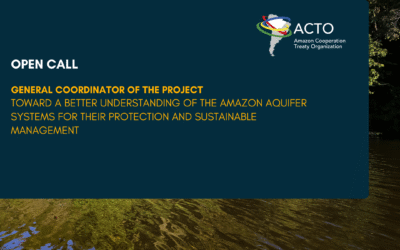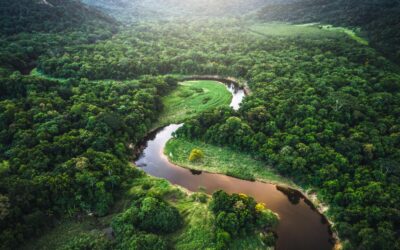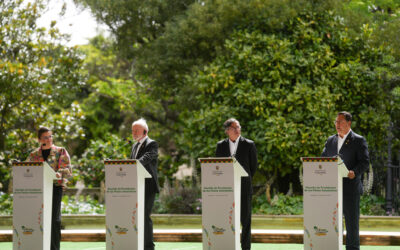On November 17, the 4th Technical Meeting of the Coordinators of the National Coordination Units of the Amazon Basin Project was held virtually. The project is run by ACTO with support from UNEP and funding from the GEF to implement the actions of the Strategic Actions Program (SAP). The SAP is a regional strategy of the ACTO member countries for Integrated Water Resources Management (IWRM) in the Amazon Basin.
The participants of the 4th Technical Meeting were welcomed by Ambassador Carlos Lazary, Executive Director of ACTO, as well as Isabelle Vanderbeck, UNEP Program Manager, and Maria Apostolova, Regional Project Coordinator.
The technical meetings are held periodically with the aim of deepening the approach and building bridges between the National Coordinators and Assistants, members of the Project’s National Coordination Units, to ensure a common understanding of the progress and planning of the implementation of national and regional activities.
The 4th Technical Meeting was attended by more than 50 professionals who shared the progress made in implementing the SAP in their countries, as well as the lessons learned and challenges encountered, highlighting the activities carried out within the framework of national and binational interventions aimed at promoting IWRM in the region.
National SAP Implementation Workshops
In his opening speech, Ambassador Lazary congratulated and thanked the countries for planning and holding the National Workshops for the Implementation of the Strategic Actions Program, “in which the common denominator was multisectoral participation and the reaffirmation of commitment at the political and technical level to the implementation of the SAP and the consolidation of the National Action Plans (NAPs)”.
Since August, the Amazonian countries of ACTO have been holding these workshops, which bring together governments, experts and civil society to strengthen national capacities for Integrated Water Resources Management in the Amazon Basin, combining the technical and cultural dimensions and seeking to identify opportunities for regional collaboration.
During the workshops, participants draw up recommendations and identify challenges and advances in the field of IWRM in each of the countries, thus contributing to the National Action Plans.
The coordinator of the Amazon Basin Project, Maria Apostolova, highlighted the implementation of gender equality training in each of the six workshops held so far. “These were very important moments for the implementation of the SAP, because the training sessions addressed an issue that is not very clearly defined in the Program, which is the inclusion of gender equality across the board in all strategic activities and actions.”
In this regard, the more than 300 participants in the workshops held in Bolivia, Colombia, Guyana, Peru, Suriname and Venezuela received initial training on the importance of women’s effective participation in water management in the Amazon, while a total of 86 people took part in training specifically aimed at using tools to formulate and implement policies, plans and programs, as well as projects that consider and incorporate the gender perspective.
National interventions
Within the framework of the Amazon Basin Project, 17 interventions were planned focusing on the following themes: establishing innovative incentive-based financing mechanisms (4 interventions); operational forecasting and early warning systems to respond to extreme hydro-climatic events (3 interventions); solutions based on natural infrastructure (4 interventions); efficient use of water and alternative supply solutions in Andean communities affected by the loss of glaciers (2 interventions) and protection of groundwater sources to reduce flood contamination in urban centers (4 interventions).
At the IV Technical Meeting, the National Coordinators, in addition to sharing the results of the National Workshops, presented the progress and challenges in implementing the interventions and defined the next stages of activities.
Bolivia highlighted the installation of two glacier monitoring stations in the Tuni reservoir and the Condoriri basin to guarantee water security for the cities of La Paz and El Alto, as well as the establishment of monitoring networks for two aquifers in the Madera river basin, responsible for supplying water to more than 1.5 million inhabitants in the cities of Santa Cruz de la Sierra and Sacaba.
Brazil presented the project being carried out in the region known as Middle Lando, in the state of Pará, to guarantee the provision of forest ecosystem services through socio-environmental contributions made by indigenous, riverine and agro-extractivist families, based on their traditional knowledge and through income generation.
Suriname, as part of its intervention to implement a collective economic incentive mechanism, highlighted the technical visit to a degraded mangrove area north of Paramaribo, where forest rehabilitation is planned through payment for the socio-environmental contribution of local communities.
At the meeting, the conclusion of the Brazil-Colombia binational study on the quality of the groundwater that supplies the populations of Tabatinga and Leticia, twin cities located on the border between the two countries, was highlighted.
Peru commented on the progress of activities related to the intervention that will install monitoring stations in the Andes, directly benefiting a population of 30,727 people and indirectly more than 220,000 people.
The other countries mentioned the steps they have taken so far to start activities related to their national interventions.
Integrated monitoring systems
At the meeting, the Work Plan for the conceptualization, consolidation and operation of a series of interconnected, compatible, operational and agreed monitoring systems for the entire Amazon Basin was presented.
“The systems will integrate data from all countries, generating indicators that will enable decision-making, the management of water resources, the conservation and protection of the Amazon Basin’s aquatic ecosystems and compliance with international agreements,” explained Naziano Filizola, the consultant responsible for the activity.
The project aims to consolidate and put into operation, in accordance with international technical protocols, an Integrated Water Resources Monitoring System. This system will integrate and consolidate the Regional Water Quality Network, including a set of laboratories, and the Amazon Hydrometeorological Network, which measures levels, flows and rainfall, already in operation in the Amazon Networks Module of the Amazon Regional Observatory (ORA), as well as starting a joint monitoring program for erosion and sediment transport processes.
The data from the Integrated Monitoring System will be available on an Integrated Regional Information Platform on IWRM in the Amazon Basin, which will bring together data from national water resources information systems and will be connected to ORA, an IT platform hosted on the ACTO website.
In order to promote the sustainability of the Integrated Water Resources Monitoring System at the national and regional level, the project includes the development of a technical training program for the countries and the drafting of a sustainability plan.
Regional Overview of Mercury Contamination
The UCR also unveiled the first steps of a study that will provide a regional overview of the current state of mercury pollution in the Amazon Region. In his presentation, consultant Jérémie Garnier said that the study is based on quantifying the sources of emissions and releases and identifying areas of risk and vulnerability to contamination.
The study will also generate a monitoring strategy for the main mercury-emitting activities that play a significant role in the basin, as well as a pollution atlas. Finally, a proposal will be developed for technical training for standardized monitoring and analysis of mercury distribution in the Amazon Basin and a course aimed at professionals from the eight Amazonian countries.











